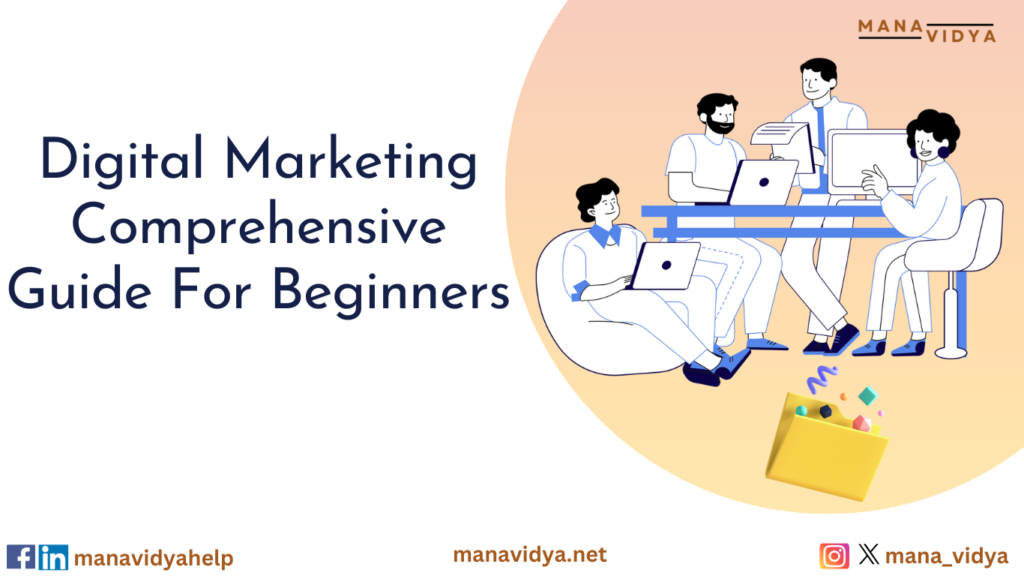Digital marketing refers to the use of digital channels to reach and engage customers. It encompasses a wide range of tactics, including search engine optimization (SEO), social media marketing, content marketing, email marketing, and pay-per-click (PPC) advertising.

Importance of Digital Marketing: In today’s digital age, digital marketing is essential for businesses of all sizes. It allows them to reach a wider audience, build brand awareness, generate leads, and drive sales.
Online Marketing Strategy: The process of promoting products or services online.
Digital Marketing Channels: The various online platforms and tools used for digital marketing, such as websites, social media, email, and search engines.
Digital Marketing Strategy: A well-defined digital marketing strategy is crucial for achieving business goals.
Digital Audience Analysis and Key Components:
- Target Digital Audience: Understanding who your ideal customers are.
- Goals: Setting clear and measurable objectives.
- Tactics: Choosing the right digital marketing channels and tactics.
- Budget: Allocating resources effectively.
- Measurement entails monitoring and assessing key performance indicators (KPIs).
Digital Marketing Measurement Tools: Measuring performance is essential for understanding the effectiveness of your digital marketing efforts.
KPI Metrics for Digital Marketing:
- Website Traffic
- Conversion Rates
- Social Media Engagement
- Return on Investment (ROI)
Digital Marketing Customer Engagement: Building relationships with potential and existing customers is essential for long-term success.
DIGITAL MARKETING SEO (Search Engine Optimization)
What is SEO? The practice of optimizing a website’s presence in search engine results pages (SERPs). There are different types of SEO techniques, for the beginners focus on the two types and you learn how to optimize on-page optimization and off-page optimization.
Key Components:
- On-page optimization in Digital Marketing (e.g., keyword research, content creation, meta tags)
- Off-page optimization in Digital Marketing (e.g., link building, social media)
ON-PAGE SEO TECHNIQUES IN DIGITAL MARKETING:
On-page SEO focuses on optimizing individual web pages. The key elements include.
- Keyword research analysis and optimization
- High quality content creation.
- Meta Tags (Title Description)
- Header Tags (H1, H2, etc.)
- URL Structure
- Internal Linking
- Image Optimization (alt text, files names)
OFF-PAGE SEO TECHNIQUES IN DIGITAL MARKETING:
Off-page SEO in digital marketing involves activities outside your website to improve its authority and ranking. Digital Marketing strategy for a brand as follows.
- Link building (backlinks from famous websites)
- Social Media Marketing
- Influencer outreach
- Guest Blogging
- Brand Mentions
Search Engine Marketing (SEM): Paid advertising on search engines, such as Google Ads, Microsoft Ads.
Display Advertising: Ads that appear on websites and apps.
Benefits:
- Reach a wider audience
- Target specific demographics
- Measure results accurately.
4 BEST SEO TIPS IN DIGITAL MARKETING:
Presenting the appropriate offer to the appropriate individual at the appropriate time is the most crucial rule in digital marketing, in the proper location.
Conduct Keyword research
Effective SEO starts with thorough keyword research. This involves identifying the terms and phrases your target audience in searching for and focus on
- Search Volume
- Keyword difficulty
- Relevance to your content
- Long-tail keywords for niche targeting
Create high-quality content
Build backlinks
Optimize website speed and mobile friendliness
CONTENT MARKETING:
Content Creation in Digital Marketing deals with content creating strategies
- Identifying relevant topics and keywords
- Writing compelling articles and social media posts
- Producing high-quality images, videos, and infographics
BUILDING ONLINE PRESENCE:
Establishing a strong online presence across various digital channels, including
- Setting up and optimizing social media profiles
- Building a user-friendly and mobile-responsive website
- Optimizing website content for search engines
PROMOTING YOUR BRANDING AND MARKETING
Firstly make sure you have an idea on brand awareness and you promote social media advertising, influencer marketing and Email marketing campaigns.
DIGITAL MARKETING RESOURCES AND TOOLS:
- Create a digital marketing budget and allocate resources for digital marketing effectively.
- Overview of free SEO and low-cost digital marketing tools and resources available to beginners and for small businesses.
SOCIAL MEDIA MARKETING:
Social media marketing Strategy, Planning, and Publishing:
- Creating a Strategy: Defining your goals, target audience, and key metrics.
- Content Planning: Developing a content calendar and creating engaging content.
- Publishing: Scheduling and publishing content across different platforms.
Listening and Engagement on Social Media:
- Monitoring Conversations: Tracking mentions of your brand and industry.
- Engaging with Customers: Responding to comments, messages, and reviews.
Social Media Analytics and Reporting:
- Measuring Performance: Tracking metrics such as likes, shares, comments, and website traffic.
- Analyzing Data: Identifying trends and insights to improve your strategy.
Paid Social Media:
- Benefits of Paid Advertising: Reach a larger audience, target specific demographics, and measure results accurately.
- Social Media Platforms in Digital Marketing: Facebook Ads, Instagram Ads, Twitter Ads, etc.
STAY UPDATED AND CONTINUOS LEARNING:
- Emphasis on the importance of staying updated with the latest trends and developments in digital marketing.
- Suggestions for further learning resources, such as online digital marketing courses from various platforms like SEMRUSH Academy, HubSpot Online Marketing Course, Google Digital Marketing, MOZ digital marketing course, etc. and industry publications.